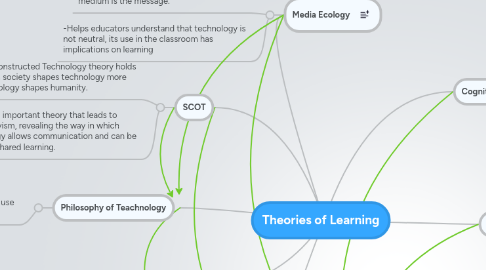Theories of Learning
by Craig Miller

1. Connectivism
1.1. -Connecting specialized nodes, or sources of information
1.2. -The learner is themselves a node
1.3. -Learning in the digital age requires new theories beyond the tried and true
2. Media Ecology
2.1. -The study of media environments, and how media impacts what it presents, i.e. "the medium is the message."
2.2. -Helps educators understand that technology is not neutral, its use in the classroom has implications on learning
3. SCOT
3.1. -Socially Constructed Technology theory holds that human society shapes technology more than technology shapes humanity.
3.2. -This is an important theory that leads to Connectivism, revealing the way in which technology allows communication and can be used for shared learning.
4. TPACK
4.1. where technology meets pedagogy meets content of what is being taught in the classroom
5. Philosophy of Teachnology
5.1. a teacher's personal philosophy of how to use technology in the classroom
6. Constructivism
6.1. -Learning is constructed by the learner, that is, built upon prior knowledge
6.2. -Learning is active, and requires authentic environments
6.3. -Social Constructivist theory states that learning is done in collaboration with a mentor
6.4. -Taken with Connectivism, social constructivist theory holds that authentic learning can take place online with group communication and opportunities for collaborative projects and social interaction based learning.
7. Cognitive Load Theory
7.1. -Refers to learning models based on memory and the brain's functional capacity to retain knowledge
7.2. -A relevant corollary to the digital age is the idea of Information overload--once the brain had processed all it can process it will not accept more information, i.e. too many web pages viewed in one sitting


